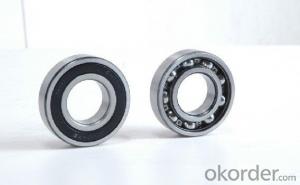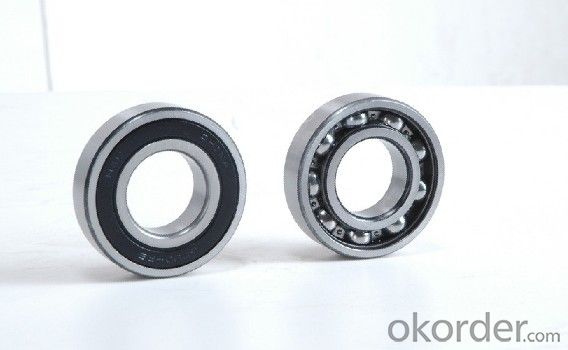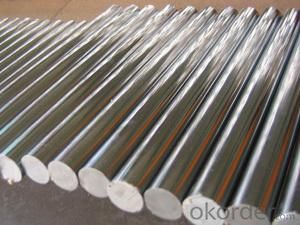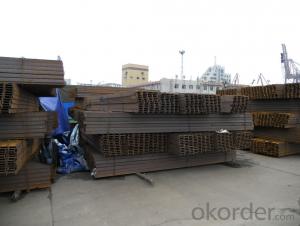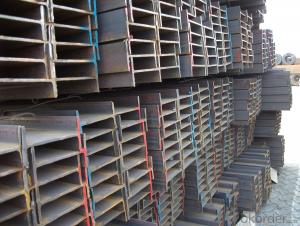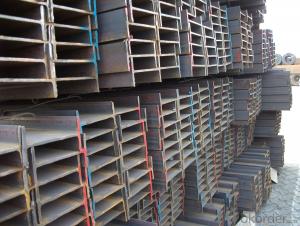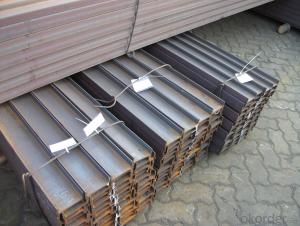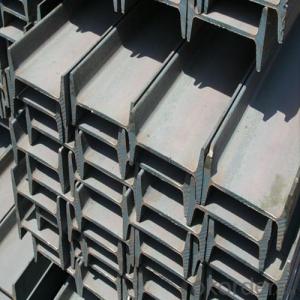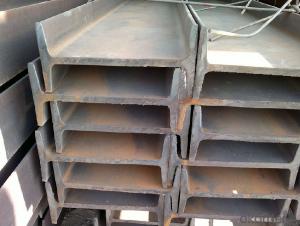Stainless IPEAA 200 IPE for construction
- Loading Port:
- Tianjin
- Payment Terms:
- TT or LC
- Min Order Qty:
- 10000 m.t.
- Supply Capability:
- 10000 m.t./month
OKorder Service Pledge
OKorder Financial Service
You Might Also Like
Product Description:
OKorder is offering Stainless IPEAA 200 IPE for construction at great prices with worldwide shipping. Our supplier is a world-class manufacturer of steel, with our products utilized the world over. OKorder annually supplies products to European, North American and Asian markets. We provide quotations within 24 hours of receiving an inquiry and guarantee competitive prices.
Product Applications:
Stainless IPEAA 200 IPE for construction are ideal for structural applications and are widely used in the construction of buildings and bridges, and the manufacturing, petrochemical, and transportation industries.
Product Advantages:
OKorder's Stainless IPEAA 200 IPE for construction are durable, strong, and resist corrosion.
Main Product Features:
· Premium quality
· Prompt delivery & seaworthy packing (30 days after receiving deposit)
· Corrosion resistance
· Can be recycled and reused
· Mill test certification
· Professional Service
· Competitive pricing
Product Specifications:
Grade | AISI 52100, ASTM E52100, DIN 1.3505,JIS SUJ2, GCr15 |
Dimensions | Diameter: 30-60mm Length: 2000-13000mm or as required |
Shape | Round Bar |
Type | Alloy Steel Bar |
Delivery Condition | Black Surface |
Material | Bearing Steel |
Technique | Hot Rolled |
Usage and Applications of Bearing Steel Round Bar
Bearing steels are used for ball and roller bearing applications and are comprised of low carbon steels and high carbon through harden able steel.
First the famous 1C-1.5Cr steel from which the majority of bearings are made. Its structure is apparently well-understood and the focus is on purity in order to avoid inclusions which initiate fatigue during rolling contact. Then there is the M50 steel and its variants, from which bearings which serve at slightly higher temperatures in aeroengines are manufactured, based on secondary-hardened martensite.
Tapered roller bearing are generally used to support combined load mainly consisting of radial load. Their cups are separable for easy assembling ,During mounting and using, radial clearance and axial clearance can be adjusted and preloaded mounting can be made.
Packaging & Delivery of Bearing Steel Round Bar
Packaging Detail: ASTM 52100 Steel in seaworthy packing or on customer request; Packed in bundles with standard export sea-worthy package or as customer require
Delivery Detail: 45 days after confirmed
Trade terms: FOB, CFR, CIF ou as customer's required
MOQ: 25 tons or at customer's demands. If the quantity is good, the price will be better.
Processing of Bearing Steel Round Bar
The processing of Bearing Steel Round Bar is hot rolled (strictly control sulphur, phosphorus and non-metallic inclusions content and distribution)
Chemical Composition of Bearing Steel Round Bar
C | Si | Mn | Cr | Ni | Cu |
Equal or less than | |||||
0.95-1.05 | 0.15-0.35 | 0.25-0.45 | Cr:1.40-1.65 | 0.30 | 0.25 |
All products' chemical composition and specification can be design according to customers' requirement.
Note of Bearing Steel Round Bar
1. According to national standard (GB) for our products, if not, supply according to national standards (GB) or agreement.
2. We can not only provide electric furnace +LF+VD and electros lag re-melting (ESR) steel forging materials, but also forging products of piece, bar, etc.
3. Our company is equipped with roll equipment and can provide our customers with roll billets or finished.
4. Please send us your detailed specifications when inquire. We will reply to you ASAP.
5. Certificate of quality is issued in English, in addition the normal terms, production process, the mechanical property (yield strength, tensile strength, elongation and hardness. forged ratio, UT test result, Grain size, heat treatment methods and the sample of is shown on the certificate
FAQ:
Q1: How soon can we receive the product after purchase?
A1: Within three days of placing an order, we will begin production. The specific shipping date is dependent upon international and government factors, but is typically 7 to 10 workdays.
Q2: Can stainless steel rust?
A2: Stainless does not "rust" as you think of regular steel rusting with a red oxide on the surface that flakes off. If you see red rust it is probably due to some iron particles that have contaminated the surface of the stainless steel and it is these iron particles that are rusting. Look at the source of the rusting and see if you can remove it from the surface.
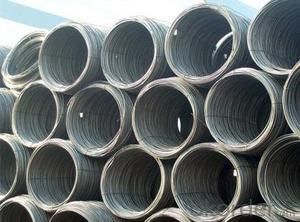
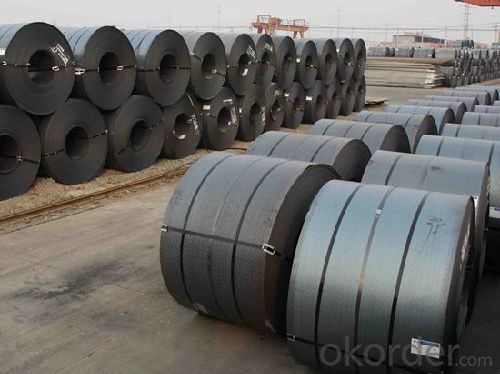
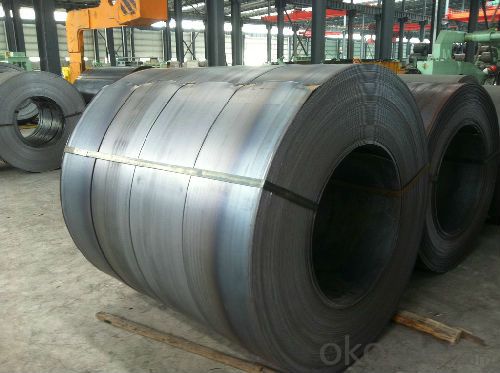
- Q: What are the requirements for special steel used in pharmaceutical manufacturing?
- The pharmaceutical manufacturing industry demands stringent requirements for special steel. To guarantee the safety, purity, and effectiveness of the products, the steel must adhere to specific specifications and meet various criteria. Foremost, the steel used in pharmaceutical manufacturing must be of top-notch quality and possess exceptional corrosion resistance. This is vital to prevent any contamination or reaction with the pharmaceutical compounds or chemicals involved. It is imperative that the steel does not release any impurities that could compromise the purity of the final product. Additionally, the steel must be capable of withstanding high temperatures and pressures, as pharmaceutical manufacturing processes often involve heat treatment, sterilization, and other high-temperature operations. It is crucial that the steel maintains its structural integrity and does not affect the quality of the pharmaceutical products under these conditions. Another significant requirement for the steel used in pharmaceutical manufacturing is easy cleanability. The steel should have a smooth surface without any cracks, crevices, or rough areas that could trap bacteria, contaminants, or residues. This is essential to maintain the hygiene and sterility of the manufacturing environment and ensure that the pharmaceutical products meet the highest quality standards. Furthermore, the steel must comply with regulatory standards and industry guidelines. It should meet the specific requirements set by regulatory bodies such as the Food and Drug Administration (FDA) or the European Medicines Agency (EMA). These standards often include specifications regarding the composition, mechanical properties, and traceability of the steel. In conclusion, the requirements for special steel used in pharmaceutical manufacturing are strict and encompass factors such as top-notch quality, corrosion resistance, heat resistance, cleanability, and compliance with regulatory standards. Meeting these requirements is vital to guarantee the safety, purity, and effectiveness of the pharmaceutical products manufactured using this steel.
- Q: What are the applications of special steel in the automotive supply chain?
- Special steel has various applications in the automotive supply chain. It is commonly used in the manufacturing of critical components such as engine parts, suspension systems, and transmission gears. The high strength, durability, and heat-resistance properties of special steel make it suitable for these applications, ensuring optimal performance and safety in vehicles. Additionally, special steel is also utilized in the production of specialized tools and equipment used in automotive manufacturing processes.
- Q: What are the advantages of using special steel in construction?
- The advantages of using special steel in construction include its superior strength and durability, which allows for the construction of taller and more complex structures. Special steel also offers excellent resistance to corrosion, fire, and extreme weather conditions, ensuring the longevity of the building. Additionally, it provides greater design flexibility, enabling architects and engineers to create innovative and unique structures. Finally, special steel is sustainable and recyclable, making it an environmentally friendly choice for construction projects.
- Q: What are the different production methods for special steel?
- Special steel can be produced using various methods, each with its unique advantages and characteristics. Some commonly used methods include: 1. Electric Arc Furnace (EAF): Scrap steel is melted in an electric arc furnace, where intense heat generated by an electric current melts the materials. EAF is known for its flexibility, as it can produce a wide range of steel grades and alloys. 2. Basic Oxygen Furnace (BOF): Molten iron from a blast furnace is combined with scrap steel and oxygen in this process to remove impurities and adjust the carbon content. BOF is famous for its high production capacity and the ability to produce large quantities of steel. 3. Vacuum Induction Melting (VIM): VIM is a method employed to produce high-quality and high-purity steel. It involves melting the raw materials in a vacuum environment to prevent contamination and achieve precise control over the alloy composition. 4. Continuous Casting: Molten steel is poured into a water-cooled mold in this method, which continuously produces solidified steel slabs, blooms, or billets. Continuous casting is efficient and capable of producing consistent and defect-free steel products. 5. Powder Metallurgy: Metal powders are compacted and sintered to produce steel with specific properties in this technique. Powder metallurgy enables the production of complex shapes, improved mechanical properties, and the incorporation of challenging-to-achieve alloying elements through traditional methods. 6. Additive Manufacturing (AM): AM, also known as 3D printing, is a relatively new method for producing special steel. It involves layer-by-layer deposition of metal powders, which are then fused together using heat or a laser. AM offers design freedom, the capability to produce complex geometries, and the potential for customized steel parts. Each production method possesses its advantages and limitations, and the selection depends on factors such as desired steel properties, production volume, cost considerations, and the specific requirements of the end-use application.
- Q: How does special steel contribute to the hardness of products?
- Special steel contributes to the hardness of products through its unique composition and manufacturing processes. Unlike regular steel, special steel is alloyed with additional elements such as chromium, nickel, and manganese, which enhance its strength and durability. These alloying elements form solid solutions within the steel matrix, creating a more rigid and dense structure. The presence of these alloying elements in special steel allows for the formation of various microstructures, such as fine-grained structures or martensitic structures, which significantly increase the hardness of the steel. Moreover, special steel often undergoes heat treatment processes like quenching and tempering, which further refine its microstructure and improve its hardness. Additionally, the manufacturing processes used for special steel, such as hot rolling or cold working, can also contribute to its hardness. These processes deform the steel, aligning its grain structure and reducing any defects or impurities present, leading to a more uniform and harder material. The hardness of special steel is crucial in various industries where strength and resistance to wear and deformation are essential. For example, in the automotive industry, special steel is used to manufacture components like engine parts, gears, and axles, which require high hardness to withstand the demanding conditions and loads they experience. Similarly, in the construction industry, special steel is used for producing tools, cutting blades, and reinforcement bars, where hardness is crucial for longevity and performance. In summary, special steel contributes to the hardness of products through its unique alloying elements, manufacturing processes, and heat treatments. Its ability to form microstructures and its resistance to deformation make it an ideal material for applications where hardness is essential for performance and durability.
- Q: Can special steel be used for making nuclear industry components?
- Yes, special steel can be used for making nuclear industry components. Special steel, also known as stainless steel, possesses excellent corrosion resistance, high strength, and heat resistance properties, making it suitable for various applications in the nuclear industry. It is commonly used for manufacturing reactor vessels, steam generators, fuel cladding, and other critical components that require durability and reliability in nuclear power plants.
- Q: Is special steel suitable for structural applications?
- Yes, special steel is suitable for structural applications. Special steel refers to high-quality steel that is specially engineered to have specific properties and characteristics to meet the demands of various applications. It is often used in industries such as construction, automotive, aerospace, and oil and gas. Special steel is known for its exceptional strength, durability, and resistance to corrosion, making it an ideal material for structural applications. It can withstand heavy loads, high temperatures, and extreme weather conditions, ensuring the safety and longevity of structures. Additionally, special steel offers excellent weldability, machinability, and formability, allowing for flexibility in design and construction. It can be easily shaped, fabricated, and assembled into various structural components, making it suitable for complex and unique projects. Furthermore, special steel is available in a wide range of grades and types, each with specific properties tailored for different structural requirements. These include carbon steel, alloy steel, stainless steel, and tool steel, among others. This versatility allows engineers and designers to select the most suitable type of special steel for their specific application, ensuring optimal performance and cost-effectiveness. In conclusion, special steel is highly suitable for structural applications due to its exceptional strength, durability, resistance to corrosion, and flexibility in design. Its wide range of grades and types offers engineers and designers the ability to choose the most appropriate material for their specific project requirements.
- Q: How does special steel contribute to reducing product maintenance requirements?
- Special steel contributes to reducing product maintenance requirements by offering superior strength, durability, and resistance to wear and corrosion. Its unique properties allow for the creation of longer-lasting and more reliable products, reducing the need for frequent repairs and maintenance. Additionally, special steel's high tensile strength enables the development of lighter and more efficient designs, reducing the strain on components and minimizing wear and tear.
- Q: Can special steel be used in the agricultural industry?
- Yes, special steel can be used in the agricultural industry. It is often utilized in the manufacturing of various farm equipment and machinery, such as plows, harrows, cultivators, and tractor components. Special steel's high strength, durability, and resistance to corrosion make it suitable for withstanding the demanding conditions and prolonged use in agricultural operations.
- Q: How does special steel perform in heat treatment applications?
- Special steel is specifically designed to perform well in heat treatment applications. Unlike regular steel, special steel has been alloyed with specific elements to enhance its heat resistance and improve its mechanical properties. When subjected to heat treatment processes such as annealing, quenching, tempering, or hardening, special steel undergoes structural changes that result in improved strength, hardness, toughness, and wear resistance. The performance of special steel in heat treatment applications can be attributed to its unique alloying elements, such as chromium, molybdenum, nickel, and vanadium. These elements form various carbides, nitrides, or intermetallic compounds during heat treatment, which contribute to the overall improvement in the steel's properties. For example, chromium forms chromium carbides that increase hardness and corrosion resistance, while molybdenum and vanadium promote hardenability and wear resistance. Moreover, special steel exhibits excellent dimensional stability during heat treatment. It has a low tendency to warp or distort, ensuring that the final product maintains its desired shape and dimensions. This dimensional stability is particularly crucial for applications that require tight tolerances or intricate designs. Additionally, special steel offers consistent and reliable heat treatment results. Its composition and microstructure are carefully controlled, ensuring that it responds predictably to heat treatment processes. This allows manufacturers to achieve the desired mechanical properties consistently, reducing the risk of inconsistencies or failures in the final product. In summary, special steel performs exceptionally well in heat treatment applications. Its unique alloying elements, dimensional stability, and consistent heat treatment response make it an ideal choice for applications that require improved strength, hardness, toughness, and wear resistance. Whether it is for automotive components, tooling, or industrial machinery, special steel delivers reliable and enhanced performance after undergoing heat treatment processes.
Send your message to us
Stainless IPEAA 200 IPE for construction
- Loading Port:
- Tianjin
- Payment Terms:
- TT or LC
- Min Order Qty:
- 10000 m.t.
- Supply Capability:
- 10000 m.t./month
OKorder Service Pledge
OKorder Financial Service
Similar products
Hot products
Hot Searches
Related keywords
